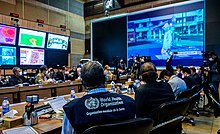World Health Organization response to the COVID-19 pandemic
The COVAX program, co-led by the WHO, Gavi, and the Coalition for Epidemic Preparedness Innovations (CEPI), aims to accelerate the development and manufacture of COVID-19 vaccines and to guarantee fair and equitable access for every country in the world.
[3][4][5] On 27 August 2020, WHO Director General Tedros Adhanom Ghebreyesus announced that an independent expert committee would be established to examine various aspects of the international treaty that governs preparedness and response to health emergencies.
[6] A WHO-led international mission arrived in China in January 2021 to investigate the origins of the COVID-19 pandemic, and released preliminary findings the following month.
[9] In December 2020, it was reported that a WHO-led international mission was expected to travel to China in the first week of January 2021 to investigate the origins of the COVID-19 pandemic.
[7] On 31 December 2020, the World Health Organization granted emergency use listing for the Tozinameran – COVID-19 mRNA vaccine (nucleoside modified) – Comirnaty.
[148][149][150] Mike Ryan, WHO emergencies chief, said that the purpose of the trip was to find "the answers here that may save us in future - not culprits and not people to blame".
[151] U.S. officials denounced the investigation as a "Potemkin exercise" and criticised the "terms of reference" allowing Chinese scientists to do the first phase of preliminary research.
[152][153] Epidemiologist Fabian Leendertz, who is part of the team, clarified that the mission is a data-based investigation and advised against "Trump style finger-pointing."
[155][156] It was revealed during the meeting that the WHO lacked an adequate financing system after its largest donor, the U.S., announced its planned withdrawal (later canceled) over claims that the organization was heavily influenced by China during the coronavirus pandemic.
[168] On 30 April 2021, the World Health Organization granted emergency use listing for the Moderna COVID-19 mRNA Vaccine (nucleoside modified).
[173][174] On 22 December 2021 the WHO issued an update clarifying that COVID-19 disease was low in children and adolescents, and that vaccination in those age groups was not recommended, sparing valuable resources for other populations most in need.
[193] Additional corporate partners of the campaign include Allen & Overy, Benevity, Blue State Digital, Charities Aid Foundation, DFS Group, eBay, Etsy, Facebook, Global Citizen, Mastercard, PagerDuty, Pandemic Action Network, Religions for Peace, Russell Reynolds Associates, Salesforce, Workday and XpresCheck.
[179] Along with Tedros, Michael J. Ryan, executive director of WHO's Health Emergencies Programme and Maria Van Kerkhove, technical lead of COVID-19 Response, appear in press conferences at WHO Headquarters in Geneva.
[197] Initial concerns included the observation that while the WHO relies upon data provided and filtered by member states, China has had a "historical aversion to transparency and sensitivity to international criticism".
[198] Jeremy Youde, a global health politics researcher and dean at the University of Minnesota Duluth, said that WHO officials may have calculated that "naming and shaming" would not get the Chinese government to cooperate, and that instead of highlighting the lack of information sharing, the WHO may have intentionally decided to praise China's efforts and thank Beijing for its cooperation to keep the Chinese government on board and engaged with the WHO.
"[5] Some observers have said WHO is unable to risk antagonizing the Chinese government, as otherwise, the agency would not have been able to stay informed on the domestic state of the outbreak and influence response measures there, after which there would have "likely have been a raft of articles criticizing WHO for needlessly offending China at a time of crisis and hamstringing its own ability to operate.
"[5] Through this, experts such as Dr. David Nabarro have defended this strategy in order "to ensure Beijing's co-operation in mounting an effective global response to the outbreak".
"[205] A week earlier, at a press briefing, Trump had criticized WHO for "missing the call" on the coronavirus pandemic and had threatened to withhold U.S. funding to the organization; on the same day, he also tweeted a complaint that China benefits disproportionately from WHO, saying that "WHO really blew it.
It came amid constant criticism of his failure to prepare for the outbreak in the U.S., the country worst affected in terms of infection numbers as of April 15, 2020.
Citing sources within the German foreign intelligence service Bundesnachrichtendienst (BND), Der Spiegel said that the world "lost four to six weeks" in the fight against the novel coronavirus as a direct result of China's lack of transparency.
[220] Trump's successor Joe Biden reversed the decision in January 2021, saying that the WHO "plays a crucial role" in fighting COVID-19 and other public health threats.
[223] On 18 January 2021, an independent panel led by Helen Clark and Ellen Johnson Sirleaf criticised the WHO for not declaring an international emergency sooner and called for its reform.
[176][226] According to Juliette Genevaz, a political scientist specialising in contemporary China, the World Health Organization is considered to take similar lines to the Chinese government's.
[229] The US President Donald Trump accused the WHO of late response to the pandemic and said that Taiwan sent an email to the WHO on 31 December warning of human-to-human transmission, a claim that The Guardian and the fact-checking website FactCheck.org said was false.

